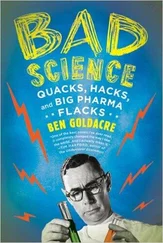Ben Goldacre - Bad Science
Здесь есть возможность читать онлайн «Ben Goldacre - Bad Science» — ознакомительный отрывок электронной книги совершенно бесплатно, а после прочтения отрывка купить полную версию. В некоторых случаях можно слушать аудио, скачать через торрент в формате fb2 и присутствует краткое содержание. Жанр: Публицистика, на английском языке. Описание произведения, (предисловие) а так же отзывы посетителей доступны на портале библиотеки ЛибКат.
- Название:Bad Science
- Автор:
- Жанр:
- Год:неизвестен
- ISBN:нет данных
- Рейтинг книги:5 / 5. Голосов: 1
-
Избранное:Добавить в избранное
- Отзывы:
-
Ваша оценка:
- 100
- 1
- 2
- 3
- 4
- 5
Bad Science: краткое содержание, описание и аннотация
Предлагаем к чтению аннотацию, описание, краткое содержание или предисловие (зависит от того, что написал сам автор книги «Bad Science»). Если вы не нашли необходимую информацию о книге — напишите в комментариях, мы постараемся отыскать её.
Bad Science — читать онлайн ознакомительный отрывок
Ниже представлен текст книги, разбитый по страницам. Система сохранения места последней прочитанной страницы, позволяет с удобством читать онлайн бесплатно книгу «Bad Science», без необходимости каждый раз заново искать на чём Вы остановились. Поставьте закладку, и сможете в любой момент перейти на страницу, на которой закончили чтение.
Интервал:
Закладка:
Leaving aside all this tragedy, what’s interesting for our purposes is the idea that you could take your Western, individualistic, patient-empowering, anti-medical-establishment and very culturally specific placebo to a country with so little healthcare infrastructure, and expect it to work all the same. The greatest irony of all is that if homeopathy has any benefits at all for AIDS sufferers in Botswana, it may be through its implicit association with the white-coat Western medicine which so many African countries desperately need.
So if you go off now and chat to an alternative therapist about the contents of this chapter – which I very much hope you will – what will you hear? Will they smile, nod, and agree that their rituals have been carefully and elaborately constructed over many centuries of trial and error to elicit the best placebo response possible? That there are more fascinating mysteries in the true story of the relationship between body and mind than any fanciful notion of quantum energy patterns in a sugar pill?
To me, this is yet another example of a fascinating paradox in the philosophy of alternative therapists: when they claim that their treatments are having a specific and measurable effect on the body, through specific technical mechanisms rather than ritual, they are championing a very old-fashioned and naïve form of biological reductionism, where the mechanics of their interventions, rather than the relationship and the ceremony, have the positive effect on healing. Once again, it’s not just that they have no evidence for their claims about how their treatments work: it’s that their claims are mechanistic, intellectually disappointing, and simply less interesting than the reality.
An ethical placebo?
But more than anything, the placebo effect throws up fascinating ethical quandaries and conflicts around our feelings on pseudoscience. Let’s take our most concrete example so far: are the sugar pills of homeopathy exploitative, if they work only as a placebo? A pragmatic clinician could only consider the value of a treatment by considering it in context.
Here is a clear example of the benefits of placebo. During the nineteenth-century cholera epidemic, deaths were occurring in the London Homeopathic Hospital at just one third of the rate as in the Middlesex Hospital, but a placebo effect is unlikely to be all that beneficial in this condition. The reason for homeopathy’s success in this case is more interesting: at the time, nobody could treat cholera. So while hideous medical practices such as blood-letting were actively harmful, the homeopaths’ treatments at least did nothing either way.
Today, similarly, there are often situations where people want treatment, but medicine has little to offer – lots of back pain, stress at work, medically unexplained fatigue and most common colds, to give just a few examples. Going through a theatre of medical treatment, and trying every medication in the book, will give you only side-effects. A sugar pill in these circumstances seems a very sensible option, as long as it can be administered cautiously, and ideally with a minimum of deceit.
But just as homeopathy has unexpected benefits, so it can have unexpected side-effects. Believing in things which have no evidence carries its own corrosive intellectual side-effects, just as prescribing a pill in itself carries risks: it medicalises problems, as we will see, it can reinforce destructive beliefs about illness, and it can promote the idea that a pill is an appropriate response to a social problem, or a modest viral illness.
There are also more concrete harms, specific to the culture in which the placebo is given, rather than the sugar pill itself. For example, it’s routine marketing practice for homeopaths to denigrate mainstream medicine. There’s a simple commercial reason for this: survey data shows that a disappointing experience with mainstream medicine is almost the only factor that regularly correlates with choosing alternative therapies. This is not just talking medicine down: one study found that more than half of all the homeopaths approached advised patients against the MMR vaccine for their children, acting irresponsibly on what will quite probably come to be known as the media’s MMR hoax. How did the alternative therapy world deal with this concerning finding, that so many among them were quietly undermining the vaccination schedule? Prince Charles’s office tried to have the lead researcher into the matter sacked.
A BBC Newsnight investigation found that almost all the homeopaths approached recommended ineffective homeopathic pills to protect against malaria, and advised against medical malaria prophylactics, while not even giving basic advice on mosquito-bite prevention. This may strike you as neither holistic nor ‘complementary’. How did the self-proclaimed ‘regulatory bodies’ in homeopathy deal with this? None took any action against the homeopaths concerned.
And at the extreme, when they’re not undermining public-health campaigns and leaving their patients exposed to fatal diseases, homeopaths who are not medically qualified can miss fatal diagnoses, or actively disregard them, telling their patients grandly to stop using their inhalers, and to throw away their heart pills. There are plenty of examples, but I have too much style to document them here. Suffice to say that while there may be a role for an ethical placebo, homeopaths, at least, have ably demonstrated that they have neither the maturity nor the professionalism to provide it. Fashionable doctors, meanwhile, stunned by the commercial appeal of sugar pills, sometimes wonder – rather unimaginatively – whether they should simply get in on the act and sell some themselves. A smarter idea by far, surely, is to exploit the research we have seen, but only to enhance treatments which really do perform better than placebo, and improve healthcare without misleading our patients.
The series also featured a brain-imaging experiment on acupuncture, funded by the BBC, and one of the scientists involved came out afterwards to complain not only that the results had been overinterpreted (which you would expect from the media, as we will see), but moreover, that the pressure from the funder – that is to say, the BBC – to produce a positive result was overwhelming. This is a perfect example of the things which you do not do in science, and the fact that it was masterminded by a ‘Professor of the Public Understanding of Science’ goes some way towards explaining why we are in such a dismal position today. The programme was defended by the BBC in a letter with ten academic signatories. Several of these signatories have since said they did not sign the letter. The mind really does boggle.
I agree: this is a bizarre and outrageous experimental finding, and if you have a good explanation for how it might have come about, the world would like to hear from you. Follow the reference, read the full paper online and start a blog, or write a letter to the journal that published it.
The Nonsense du Jour
Now we need to raise our game. Food has become, without question, a national obsession. The Daily Mail in particular has become engaged in a bizarre ongoing ontological project, diligently sifting through all the inanimate objects of the universe in order to categorise them as a cause of – or cure for – cancer. At the core of this whole project are a small number of repeated canards, basic misunderstandings of evidence which recur with phenomenal frequency.
Although many of these crimes are also committed by journalists, we will be reviewing them later. For the moment we will focus on ‘nutritionists’, members of a newly invented profession who must create a commercial space to justify their own existence. In order to do this, they must mystify and overcomplicate diet, and foster your dependence upon them. Their profession is based on a set of very simple mistakes in how we interpret scientific literature: they extrapolate wildly from ‘laboratory bench data’ to make claims about humans; they extrapolate from ‘observational data’ to make ‘intervention claims’; they ‘cherry-pick’; and, lastly, they quote published scientific research evidence which seems, as far as one can tell, not to exist.
Читать дальшеИнтервал:
Закладка:
Похожие книги на «Bad Science»
Представляем Вашему вниманию похожие книги на «Bad Science» списком для выбора. Мы отобрали схожую по названию и смыслу литературу в надежде предоставить читателям больше вариантов отыскать новые, интересные, ещё непрочитанные произведения.
Обсуждение, отзывы о книге «Bad Science» и просто собственные мнения читателей. Оставьте ваши комментарии, напишите, что Вы думаете о произведении, его смысле или главных героях. Укажите что конкретно понравилось, а что нет, и почему Вы так считаете.





![Роман Зыков - Роман с Data Science. Как монетизировать большие данные [litres]](/books/438007/roman-zykov-roman-s-data-science-kak-monetizirova-thumb.webp)






